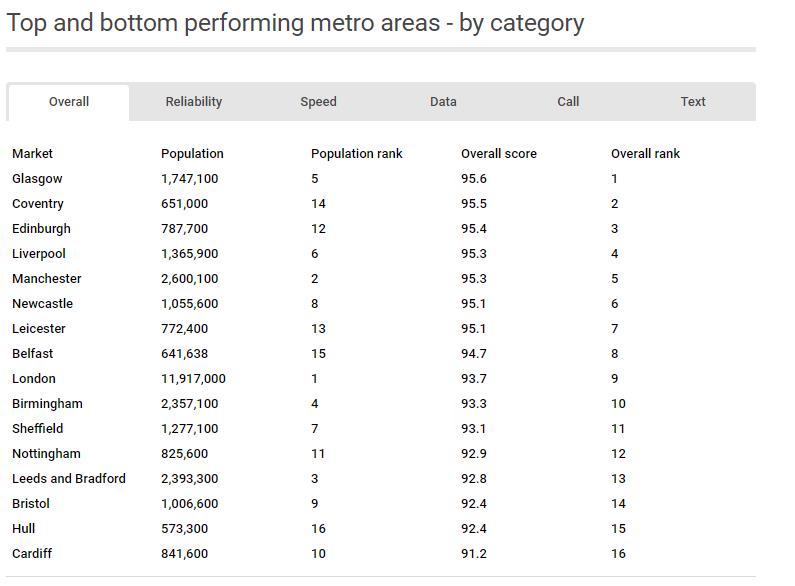oventry ranks as the most reliable city in the country, while Edinburgh finished top for the speed and data awards.London showed significant improvement climbing four places to 9th overall from 13th six months ago.
To show which cities offer the best mobile performance, Rootmetrics took the 16 most populated metro areas in the UK and ranked them from highest to lowest across each of its six categories: Overall Performance, Network Reliability, Network Speed, Data Performance, Call Performance, and Text Performance. It then compared the results to those seen in the second half of 2016.

Glasgow’s rise in the rankings correlates with strong call improvements from multiple operators compared with what Rootmetrics found in the second half of 2016; all operators delivered improved mobile-to-landline and mobile-to-mobile blocked call rates in this test period. They also delivered generally strong data reliability in terms of getting and staying connected. EE showed the most notable improvement in median download speed, jumping from 24.2 Mbps to 32.0 Mbps. Three delivered a strong improvement to its median upload speed, increasing from 3.7 Mbps to 6.1 Mbps in this test period.
Edinburgh might be in 12th place as far as the size of its population is concerned but it came third overall, up from seventh position. All four operators in Edinburgh recorded fast median download speeds, and Rootmetrics says that data reliability was quite strong amongst all operators in the market. Each operator was able to both get connected to the network and stay connected at rates of at least 98 per cent in Edinburgh.
The company notes that mobile performance in London has historically underperformed compared to what it has found in other markets during testing dating back to 2014 and this story remained the same in the second half of 2016.
However, in the first half of 2017, London improved, jumping from 13th place up to 9th in the overall performance category. In London, there were good signs from all operators across multiple performance categories. All operators delivered relatively strong data speeds and call performance was generally strong for all operators. For instance, EE delivered an improved median download speed from 30.5 Mbps up to 36.5 Mbps, while O2’s median upload speed increased from 6.5 Mbps to 7.4 Mbps.
Rootmetrics also saw improvement in O2’s dropped call rate in London. Three’s median upload speed rose from 5.0 Mbps to 6.6 Mbps, and its dropped call rate improved from 1.2 per cent to only 0.8 per cent. Likewise, Vodafone’s median upload speed increased from 7.1 Mbps to 8.8 Mbps, and its dropped call rate remained very good at 0.9 per cent.
Rootmetrics principally obtains its data via drive testing and uses consumer equipment, purchased off the shelf at operator stores. To ensure that RootMetrics’ testing reflects real-world mobile usage, testing is conducted based on where, when, and how consumers use their smartphones most often. During the last 12 months, RootMetrics has collected over 1,609,707 samples and driven nearly 48,504 miles – the equivalent of driving from Land’s End to John o’Groats nearly 56 times.
“It’s all change in the latest round of results for the metro areas, showing that like the UK’s sporting leagues, mobile performance is just as hotly contested.” said Scott Stonham, general manager of Europe at RootMetrics. “What’s clear is that, while there have been some strong performers – particularly in Scotland where Glasgow and Edinburgh are amongst the leaders – there is not a huge discrepancy across the country. It’s encouraging because it shows that while performance continues to improve there are no specific areas being left behind – although naturally some cities perform better than others.”
More detail on these results can be found here.



